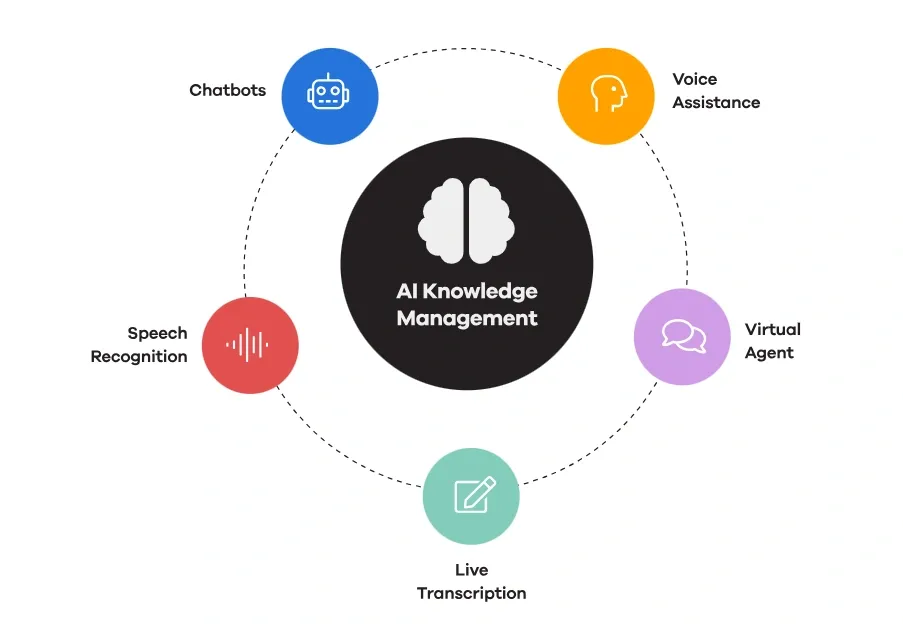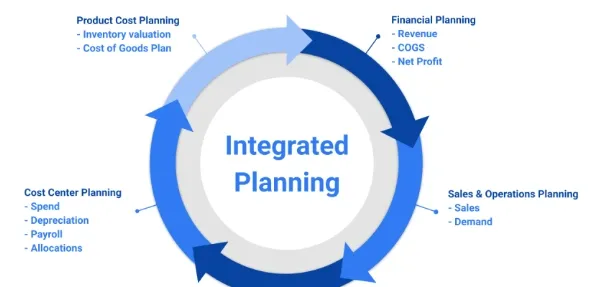What is AI Knowledge Management?
AI knowledge management is a system that uses an AI generator to manage information. It involves collecting, organizing, and sharing knowledge within an organization.
How AI Knowledge Management Works
The working process of AI knowledge management tools are:
- Collecting Data: Imagine you have a huge library. AI helps gather all books and articles into one place.
- Organizing Information: Think of a smart librarian. AI sorts the books by topic, making it easy to find what you need.
- Sharing Knowledge: Picture a bulletin board. AI helps share important updates and information quickly.
Implementing AI in Knowledge Management

Implementing AI knowledge management can transform how your business handles information. This process involves several key steps to ensure smooth operations.
Steps to Implement AI Knowledge Management Tools
The steps for implementing AI knowledge management tools are as follows:
Step 1
Assess Your Needs
Look at your current system. Identify areas where an AI generator can help. Think about what information you need to manage better.
Step 2
Plan the Integration

Make a clear plan. Decide how an AI generator will fit into your existing processes. Set goals for what you want to achieve.
Step 3
Test and Adapt
Start small. Test the AI system in one area. Learn from this and adapt as needed before a full rollout.
Choosing the Right AI Knowledge Management Tools
To select the right AI knowledge management tools, follow:
- Research Options: There are many AI knowledge management tools available. Look for AI knowledge management tools that suit your specific needs. Compare features and costs.
- Seek Recommendations: Talk to others who have used AI knowledge management tools, get their feedback, and find out what worked for them.
- Evaluate Ease of Use: Choose user-friendly AI knowledge management tools. Your team should find them easy to use and integrate.
Training Your Team For AI Knowledge Management Tools
To train your team, follow:
- Provide Training: Offer training sessions. Make sure everyone understands how to use the new AI knowledge management tools.
- Support and Resources: Give ongoing support. Provide resources like manuals and help desks.
- Encourage Feedback: Ask your team for feedback. Use this to improve how AI knowledge management tools are implemented.
Best Practices for AI Knowledge Management
To get the most out of AI knowledge management, you need to follow some best practices.
Keeping Data Clean and Organized
The first practice is to keep data clean and organized as:
- Regular Data Cleaning: Imagine your desk full of papers. Regularly clean and organize it. This helps chat AI work better and faster.
- Consistent Formatting: Use the same format for all data entries. This is like having a neat filing system, making it easy to find and use information.
- Eliminate Duplicates: Remove duplicate entries. Think of it as clearing out repeated files to avoid confusion and save space.
Regularly Updating Knowledge Base
Regularly updating the knowledge base is a good practice as:
- Schedule Updates: Set regular times to update your knowledge base. This ensures all information stays current and relevant.
- Review Content: Regularly review the content for accuracy. Correct any outdated or incorrect information to keep your data reliable.
- Add New Information: Continuously add new data. This keeps your knowledge base growing and useful.
Ensuring Data Security
To ensure data security, follow:
- Implement Strong Security Measures: Use strong passwords and encryption. This is like locking your doors to keep valuable information safe.
- Access Control: Limit who can access sensitive information. This helps prevent unauthorized use and potential data breaches.
- Regular Security Audits: Conduct regular checks. These audits help identify and fix vulnerabilities, ensuring ongoing data protection.
Challenges and Solutions
Implementing AI knowledge management comes with challenges. Understanding these challenges and finding solutions can make the process smoother.
Common Challenges
The challenges of AI knowledge management tools are:
- Data Quality: Poor data quality can hinder AI generator performance. Imagine trying to find a book in a messy library.
- User Resistance: Some team members may resist new technology. This is like people preferring old habits over new AI knowledge management tools.
- Integration Issues: Integrating AI generators with existing systems can be tricky. It’s like fitting a new puzzle piece into an old puzzle.
Overcoming These Challenges
To overcome the challenges, follow:
- Improve Data Quality: Regularly clean and update your data. This makes the information easier for the AI generator to process.
- Provide Training: Offer training to your team. Help them understand the benefits and ease of AI knowledge management.
- Plan Integration Carefully: Work with IT experts. Ensure the AI knowledge management tools fit well with your current systems.
Real-Life Examples
The real-life examples are the following:
- Retail Company: A retail company used an AI generator to manage customer data. They improved their marketing efforts by cleaning and organizing their data regularly.
- Healthcare Provider: A healthcare provider faced resistance from staff. They offered training and showed how AI generators could save time, leading to better acceptance.
- Tech Firm: A tech firm struggled with integration. They hired experts to ensure smooth chat AI implementation, leading to better system performance.
Frequently Asked Questions (FAQs)
How does AI improve knowledge management?
AI automates data organization, retrieval, and updates, ensuring information is accurate and easily accessible, which boosts efficiency and decision-making.
What are the benefits of AI knowledge management?
Benefits include better data accuracy, faster information retrieval, improved decision-making, and enhanced productivity by automating routine tasks.
What challenges are associated with AI knowledge management?
Challenges include data quality issues, user resistance, and integration difficulties with existing systems, which can hinder the implementation process.
How can businesses overcome AI knowledge management challenges?
Businesses can overcome challenges by improving data quality, providing training to employees, and planning careful integration with existing systems.
What industries benefit most from AI knowledge management?
Industries like healthcare, retail, and technology benefit significantly, as AI helps manage vast amounts of data efficiently, improving service delivery and operational efficiency.
